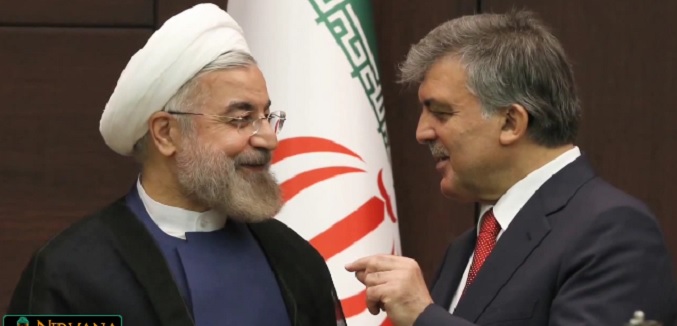An official visit to Turkey by Iranian President Hassan Rouhani triggered a flurry of diplomatic statements and economic agreements celebrated by both sides on Monday, announcements that were read by observers as straightforward evidence that relations between the two sometimes rivals were on the upswing, and which came just as Western diplomats are counting on the Islamic republic’s international isolation to coerce concessions in the context of nuclear talks.
Turkey’s office of the presidency issued a press release – and linked to it from the office’s official Twitter account for good measure – declaring that “Rouhani’s visit will open a new chapter in our bilateral relations.”
The mostly Persian-language Twitter account thought to speak for Rouhani boasted that “Turkish and Iranian presidents signed 10 documents of cooperation” during the visit.
Ankara has come under increasingly public criticism from Washington over literally years of sanctions-busting transactions with Iran, and the Washington Free Beacon quoted Jonathan Schanzer – vice president of research at the Foundation for Defense of Democracies (FDD) – explicitly contextualizing Monday’s events as coming amid Turkish sanctions busting:
“All of this comes amidst reports of massive sanctions busting facilitated by Turkey on behalf of Iran. First there was the gas-for-gold scheme where Turkey helped Iran pocket some $12 billion in oil sales,” said Jonathan Schanzer, vice president for research at the Foundation for Defense of Democracies (FDD). “This was followed up by revelations of sanctions busting on the part of Iranian businessmen in Turkey to the tune of €87 billion.”
“There may be tension over the civil war in Syria. But there appears to be far more drawing these two neighbors together than driving them apart,” Schanzer said. “This, of course, raises questions about Turkey’s reliability as a U.S. ally and as a NATO ally—questions that FDD continues to raise as it investigates Turkey’s illicit finance activity. This is activity that cannot be ignored. And this visit only punctuates our concerns.”
Relations between Ankara and Tehran have in recent years been complicated as each sought to maneuver within and across three regional blocs – a camp of Washington’s traditional Arab and Israeli allies, an Iranian-dominated Shiite crescent, and a Turkish/Muslim Brotherhood/Qatari axis – but Schanzer told Bloomberg that “there appears to be far more drawing these two neighbors together than driving them apart… [t]his, of course, raises questions about Turkey’s reliability as a U.S. ally and as a NATO ally.”
Reuters was a little more terse in conveying the same dynamic, publishing its article under the headline “Iran, Turkey pledge cooperation despite split over Syria.”
Merve Tahiroglu and Behnam Taleblu – respectively a research associate and an Iran research analyst at FDD – assessed that “Iran appears intent to peel Turkey away from the Western block.”
[Photo: Nirvana News / YouTube]




